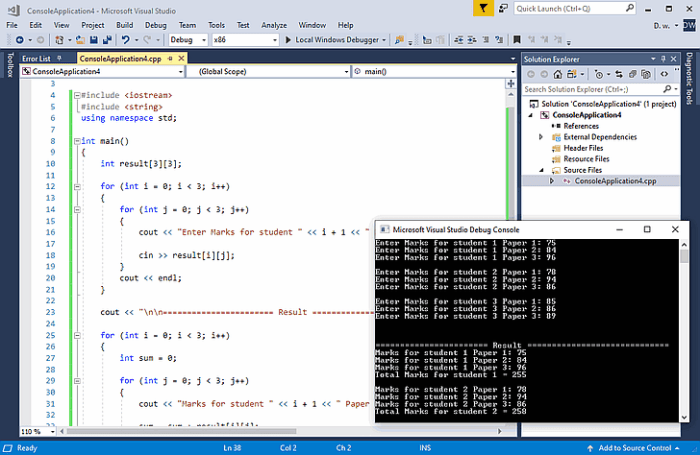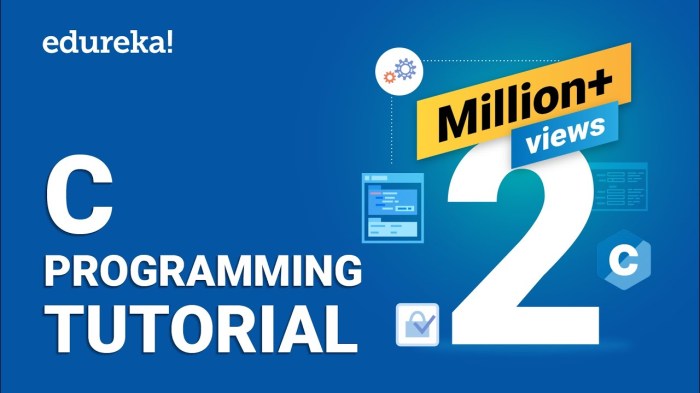
Embark on a thrilling adventure into the world of C++ programming for beginners, where each line of code tells a story of innovation and creativity right from the start.
Delve into the realm of C++ syntax, variables, and debugging techniques to unlock the secrets of successful programming.
Discuss what C++ programming is and its significance for beginners
C++ is a powerful and versatile programming language that is widely used in the software development industry. It is an extension of the C programming language with additional features such as object-oriented programming. C++ is known for its efficiency, speed, and flexibility, making it a popular choice for beginners who are looking to learn programming.
Basic Concepts and Features of C++
- C++ supports both procedural and object-oriented programming paradigms.
- It has a rich library of functions and data types for easy implementation of complex algorithms.
- C++ allows low-level memory manipulation, giving programmers more control over system resources.
- It is a compiled language, which means the code needs to be compiled before execution for better performance.
Why C++ is a Popular Choice for Beginners
- C++ is widely used in industries like game development, system programming, and financial applications, providing beginners with a wide range of career opportunities.
- Learning C++ helps beginners understand the fundamental concepts of programming, such as data structures, algorithms, and memory management.
- It is a versatile language that can be used for developing a wide variety of applications, from desktop software to embedded systems.
Importance of Learning C++ as a Foundational Language for Beginners
- Mastering C++ lays a strong foundation for learning other programming languages like Java, C#, and Python, as many of their concepts are derived from C++.
- Understanding C++ helps beginners develop problem-solving skills and logical thinking, essential for success in the field of programming.
- C++ is still widely used in the industry, making it a valuable skill for beginners seeking employment opportunities in the software development field.
Explore the fundamental principles of C++ programming
C++ programming language is based on the principles of object-oriented programming, which allows for the creation of reusable code and efficient problem-solving. Let’s delve into the syntax, structure, variables, data types, and operators in C++ to provide beginners with a solid foundation in programming.
Syntax and Structure of C++ Programs
In C++, a program is typically structured into functions, each containing a series of statements. The main function serves as the entry point of the program and is where the execution begins. The syntax of C++ programs is similar to C, with semicolons used to terminate statements and curly braces to define blocks of code.
Variables, Data Types, and Operators in C++
- Variables: In C++, variables are used to store data values that can be manipulated within the program. They must be declared with a specific data type before use.
- Data Types: C++ supports various data types such as int, float, double, char, bool, etc., each with a specific range of values and memory allocation.
- Operators: C++ provides a wide range of operators for arithmetic, logical, relational, bitwise, and assignment operations. These operators allow for the manipulation of variables and data in the program.
Examples of Basic C++ Programs
| Program | Description |
|---|---|
#include |
Prints “Hello, World!” to the console. |
#include |
Calculates the sum of two numbers and prints the result. |
Explain the key tools and resources for learning C++ programming
When starting to learn C++ programming, it is essential to have the right tools and resources at your disposal. Here, we will explore the key tools and resources that can help beginners in mastering C++ programming.
Essential IDEs for C++ programming and their features
Integrated Development Environments (IDEs) play a crucial role in C++ programming by providing a comprehensive set of tools to write, compile, and debug code. Here are some essential IDEs for C++ programming along with their features:
- Visual Studio: A popular IDE developed by Microsoft, known for its powerful features like IntelliSense, debugging tools, and seamless integration with Windows platforms.
- Code::Blocks: An open-source IDE that offers a customizable interface, support for multiple compilers, and a plugin system for extending functionality.
- CLion: A cross-platform IDE by JetBrains that provides intelligent code assistance, refactoring tools, and integration with CMake build system.
Online platforms, tutorials, and courses for beginners in C++
Online platforms, tutorials, and courses can be valuable resources for beginners looking to learn C++ programming. Here are some recommended resources:
- Codecademy: Offers interactive C++ courses for beginners to learn the basics of programming and practice coding exercises.
- Udemy: Provides a variety of C++ courses for beginners, ranging from fundamentals to advanced topics, with hands-on projects and practical examples.
- GeeksforGeeks: A platform with tutorials, articles, and coding challenges that cover C++ programming concepts in-depth, suitable for beginners and experienced programmers alike.
Tips on effectively using resources to enhance C++ programming skills
To make the most out of the tools and resources available for learning C++ programming, consider the following tips:
- Set clear learning goals and objectives to stay focused and track your progress.
- Practice consistently by working on coding exercises, projects, and challenges to reinforce your understanding of C++ concepts.
- Engage with online communities, forums, and coding groups to seek help, share knowledge, and collaborate with other C++ enthusiasts.
- Stay updated with the latest trends, updates, and best practices in C++ programming through blogs, podcasts, and online events.
Introduce common challenges faced by beginners in C++ programming

When starting to learn C++ programming, beginners often face various challenges that can hinder their progress. Understanding and addressing these common issues is essential for mastering the language effectively.One of the most common challenges faced by beginners in C++ programming is encountering errors and bugs in their code. These errors can range from syntax errors to logical errors, making it difficult for beginners to identify and correct them.
Additionally, understanding the compiler messages and debugging tools can be overwhelming at first.
Common Errors and Bugs Encountered by Beginners in C++
- Missing semicolons or brackets: Forgetting to add semicolons at the end of statements or closing brackets can lead to syntax errors.
- Variable initialization: Using variables without initializing them can result in unpredictable behavior and bugs in the program.
- Logic errors: Incorrect implementation of algorithms or conditions can cause logical errors that are harder to spot.
Troubleshooting Techniques for Resolving Errors in C++ Programs
- Compile often: Compiling the code frequently can help catch syntax errors early in the development process.
- Use debugging tools: Utilize tools like gdb or IDE debuggers to step through the code and identify the source of errors.
- Print statements: Adding print statements to display variable values can help in understanding the flow of the program and pinpointing issues.
Best Practices for Debugging and Testing C++ Code Effectively
- Write modular code: Break down the code into smaller functions to isolate and test specific parts of the program.
- Unit testing: Create test cases to verify the functionality of individual functions and components.
- Peer review: Seek feedback from peers or mentors to gain insights into improving code quality and identifying potential errors.
Relate C++ programming to computer science fundamentals

Understanding C++ programming is crucial for grasping core computer science concepts as it provides a solid foundation in problem-solving and logic. C++ is a versatile language that is widely used in various fields, making it an essential skill for aspiring computer scientists.
The Relationship Between C++ Programming and Algorithms
Algorithms are at the heart of computer science, and C++ is commonly used to implement and analyze algorithms. C++’s efficiency and flexibility make it a popular choice for developing complex algorithms that form the basis of many software applications. By learning C++, beginners can enhance their algorithmic thinking and problem-solving skills, which are essential in computer science.
- C++ allows programmers to write efficient and optimized algorithms due to its low-level features and control over memory management.
- Understanding data structures and algorithms in C++ helps beginners develop algorithmic thinking and logical reasoning skills.
- Practicing algorithm implementation in C++ can improve coding proficiency and enable beginners to tackle complex computational problems.
How C++ is Used in Software Development and Computer Programming Projects
C++ is widely used in software development for creating high-performance applications, system software, game development, and more. Its versatility and speed make it a preferred choice for projects where efficiency and control over hardware resources are essential.
- C++ is used in developing operating systems like Windows, Linux, and macOS, where performance and speed are critical.
- Game development studios often use C++ to create graphics engines, game logic, and real-time simulations due to its high performance and low-level capabilities.
- C++ is utilized in embedded systems programming, networking, and financial applications where speed and efficiency are paramount.
Ending Remarks
In conclusion, C++ programming for beginners is not just about writing code—it’s about crafting solutions and mastering the art of logical thinking through the power of programming.
Popular Questions
What makes C++ a popular choice for beginners in programming?
C++ is widely used in industries like game development, operating systems, and high-performance applications, making it a versatile language to learn.
How can beginners effectively use resources to enhance their C++ programming skills?
Beginners can benefit from online tutorials, practice coding challenges, and engaging in open-source projects to deepen their understanding and skills.
What is the significance of learning C++ as a foundational language for beginners?
Mastering C++ as a foundational language equips beginners with a strong programming base, making it easier to learn other languages and tackle complex coding tasks.
How does understanding C++ programming relate to grasping core computer science concepts?
Understanding C++ helps beginners comprehend fundamental computer science concepts like algorithms, data structures, and software design principles.